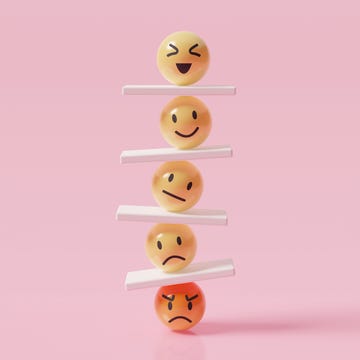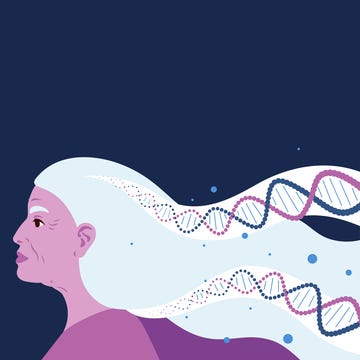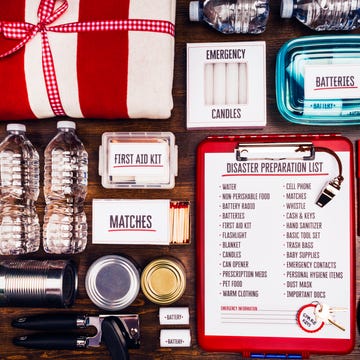Dr Ord says... As a psychologist, I specialise in your body image and eating disorder recovery. Through that work, I’ve realised that most people who struggle with their body image, and who have a disordered relationship with food, are really seeking acceptance and a sense of being safe. They’re trying to achieve that by losing weight – because diet culture has told us that will resolve everything – but it doesn’t work. I help clients learn how to accept their body as it is, and to treat their body with kindness and care. With younger people, my work involves buffering them against some of the external influences that surround them.
How do I help my child or teen develop a positive body image?
It’s very difficult to teach a child self-love and acceptance without having embraced it for yourself first... as parents, we need to fit our own oxygen masks first. In my book, I use this as a general metaphor for self-care and helping your children develop a more positive body image than you might have. It won’t just be you who will benefit from your improved relationship with your body. Part of the work in changing your relationship with your body and forging a new path for younger generations is harnessing the courage to look deeply inside yourself at the messages you’ve internalized over the years.
With children and teenagers, we need to bring the focus back to body appreciation; a focus on what the body can do – its functionality as opposed to what it looks like. And as parents, we can model this. Instead of saying: ‘I feel so fat today’, you could say something like, ‘I’m not feeling particularly comfortable in my clothes today’. You’re modelling an awareness and an openness to your feelings. You’re not lying or denying how you feel, but you’re not placing the blame on your body. You’re just recognising there’s a yucky feeling or a difficult feeling showing up and you need some comfort in that moment.
How should I talk about food?
Rather than using phrases like: ‘Oh, I’ve been really bad today’, or ‘I’ve been naughty because I’ve had a certain type of food,’ you might just say something like: ‘I really enjoyed that.’ Or, ‘all foods are part of a healthy diet.’ So you’re not moralising food, or sending this message that you are ‘good’ if you eat one thing and ‘bad’ if you eat another.
The conversation around ultra-processed foods has made this more difficult, in that there’s a further demonisation. Remember – when you heavily restrict any type of food, you raise its value. There’s no good food and no bad food, because ultimately, even ultra-processed foods, particularly some of them, such as bread or baked beans, do have nutritional value.
At mealtimes, I advocate for an approach called the division of responsibility – the parent decides what goes on the table and when, and the kids decide how much they’ll eat. For most children, that’s a really healthy way to approach food, because it helps them retain their sense of intuition and wisdom about what their individual body needs, without transposing on to them the whole mess of diet culture that we, as adults, have gone through.
To introduce this with teens, be open about it and communicate the fact that you’ve recognized that perhaps the way you’ve been doing things isn’t necessarily the best approach for the family and that these are the changes that you have in mind. Ask your kids how they feel about it and if they have any concerns. This also sets foundations of openness around food and of discussion around types of food, so that there’s not a big mystery about it.
What should I do if my child says they think they’re fat?
If your teen says: ‘Oh no, look at my stomach in these shorts’, or ‘I feel really fat,’ I’d really encourage parents to be curious about what that means. What is your kid really feeling? Is it anxiety showing up? Is it sadness? Is it apprehension? Are they feeling like they’re being left out? In helping them attune to their feelings, you identify what it is they really need – to feel soothed, comforted and safe.
Of course, the inclination as a parent is to shut this down straight away and tell them: ‘you look great!’ We do that because we don’t want kids to feel insecure and anxious. But in doing so, we dismiss how they’re feeling. We shut the conversation down, rather than opening it up, which is really what we want to be doing.
How can I boost my child’s self-esteem?
As a parent, we need to focus on building self-esteem – your self worth as a person, not just how you look. And that’s about emphasising strengths and attributes that have nothing to do with appearance. We can actually change how our children feel about their bodies by modeling and reiterating kind language and appreciation of what we do.
We all have a self-image – a way that we look at ourselves – and we measure that against an idealised self – formed by images that we might be exposed to on social media, for example. Now, if a child’s only exposed to very idealised representations of beauty and there’s a huge disparity between the way they see themselves and that idealised self, their self-esteem is going to suffer as a result. Whereas if they’ve been exposed to a narrative that all bodies are good bodies that deserve to be loved and looked after, and they’re exposed to lots of representations of different bodies, types, sizes and abilities, their idealised image is likely to be much closer to their self-image. They’ll have a much broader perspective of beauty.
What do I do about social media?
Developing digital literacy and critical awareness is really important, especially for teenagers. Click on a post, even unintentionally, and you can be completely flooded with similar posts. Helping your teen recognise when content is harmful is very important. They can recognise this by learning to tune into the response it evokes in them. When I look at this particular post or type of content, how does it make me feel? Does it make me feel good about my body or bad about my body? Does it make me feel like I need to change in some way? Does it trigger shame? If so, it’s probably not good for me.
Having a poor body image can cause so much suffering, both physically and mentally, but it doesn’t have to be that way. You can heal your relationship with your own body and nurture body confidence in your children, setting them up for a positive relationship with themselves that will serve them in every area of their lives.













